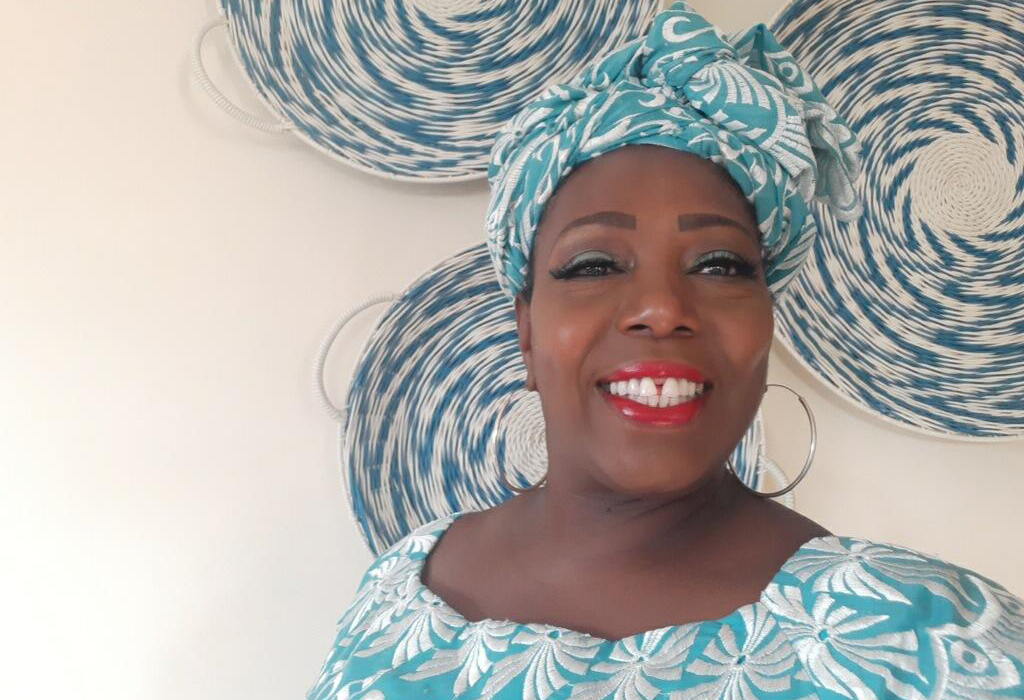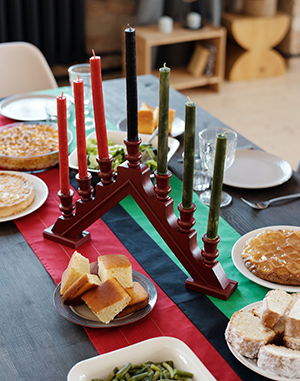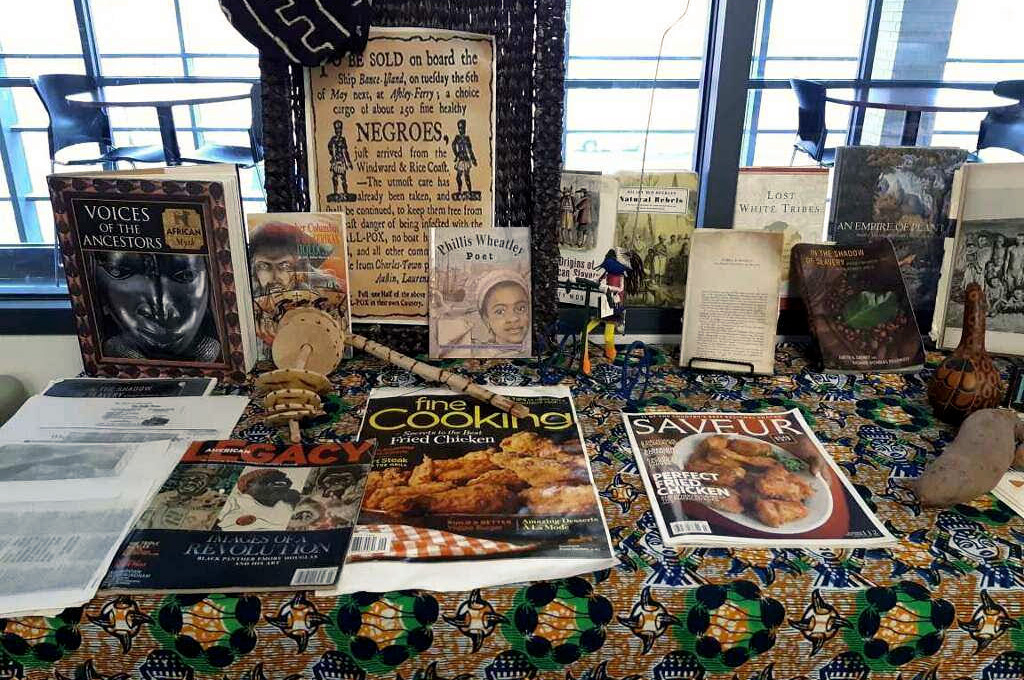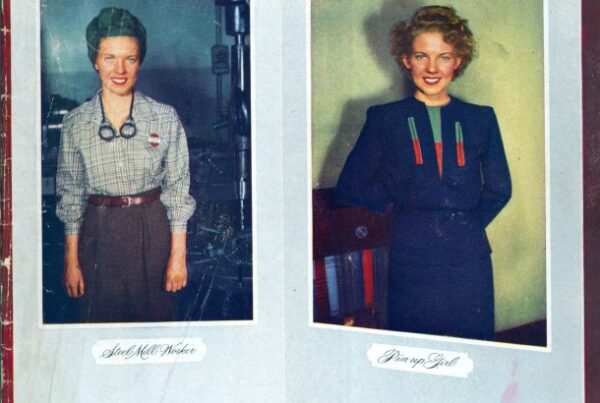
Local caterer and food scholar Olafemi Mandley
By Brianna Horan, Manager of Tourism & Visitor Experience
Cultural Heritage Recipe Box: Celebrating Kwanzaa
The holiday of Kwanzaa, observed each year from December 26 through January 1, is an African American and pan-African holiday rooted in celebrations of family, community, culture, history, and values. A week of ceremonies, reflections, and festivities affirm seven core communitarian values that are rooted in both ancient tradition and modern experience.
Modeled after the first-fruits celebrations observed to give thanks at the start of the harvest season in cultures throughout the African continent, Kwanzaa was created in 1966 by Mualanga Karenga, an activist and leader in the Black Power Movement. The secular holiday was one of the ways that his newly formed Us Organization sought to rebuild and strengthen Black communities after the 1965 Watts Riots in Los Angeles. By centering Black and African culture and history rather than being affiliated with one single religion, Kwanzaa had the potential to foster unity between all African Americans regardless of their religious beliefs.

A Kinara—Photo by Askar Abayev from Pexels
During each night of the holiday, one of the Seven Principles of Kwanzaa, or Nguzo Saba, is the focus of meditation, reflection and celebration. The Seven Principles are Umoja (Unity), Kujichagulia (Self-Determination), Ujima (Collective Work and Responsibility), Ujamaa (Cooperative Economics), Nia (Purpose), Kuumba (Creativity), and Imani (Faith). Each principle is expressed in Swahili, one of the most widely spoken languages in Africa, and is drawn from a commonly-shared value found throughout the continent with the intention of building and maintaining unified, empowered communities. A candle is lit each night on the Kinara (candlestick holder) to correspond with each principle; the black candle in the center is lit first to represent all people of African descent, and then red candles on the left representing the blood of the celebrants’ ancestors are lit alternately with green candles on the right symbolizing earth, life, and the promise of the future. Each nightly ceremony begins with an elder filling a Kikombe cha Umoja (unity cup) with wine or juice, pouring some into the earth in remembrance of the family’s ancestors, and then drinking from it and passing it around to attendees. The principle is then discussed as it relates to personal and community growth. This year, the National Museum of African American History and Culture launched a Kwanzaa online resource guide that explores the holiday’s history, traditions and meaning, and features a collection of songs, writing excerpts, recipes, and children’s activities that give meaning to each of the Seven Principles. For another digital option that lends itself nicely to virtual gatherings this year, Pittsburgh Playwrights Theatre Company is offering free viewing of its 2014 production of Ubuntu Holiday by local playwright Kim El, available through January 3.
On the evening of December 31, family and loved ones typically gather for a feast called a karamu with music and dance. It’s a time to rejoice and renew commitments for personal growth as one year leads to the next. Children often receive handmade or meaningful gifts (Zawadi), intended to symbolize the labor and love of their parents, and the commitments made and kept by children. The table where families gather is decorated with the symbols of Kwanzaa, such as the Kinara (candle holder), Mkeka (a mat representing the foundation of traditions and history that all else is built upon), Muhindi (corn to represent children and the future they hold), Mazao (fruit representing the harvest), and Zawadi (gifts). As it so often does, food brings people, traditions, and cultures together around the table, with menus featuring African-American, Caribbean, South American, and African dishes that are representative of the African diaspora.
Ola Appetit Catering Company
Local caterer and food scholar Olafemi Mandley has been exploring and sharing the ways that these foodways have nourished the bodies, minds, and souls of generations of Black people for decades. She began catering in 1988 and opened her own business, Ola Appetit Catering Company, in Duquesne in 2010. The year before that, Olafemi had hosted her first dinner celebrating Black History Month, an annual event called The Taste of Africa dinner. Pittsburgh’s City Council even declared February 18, 2020, to be “The Taste of Africa Day,” honoring Olafemi’s talents as both a chef and a storyteller. Her dishes include ingredients that are cultural staples in pan-African and African American cuisine, and they are always garnished with the history of the foods’ origins and meanings to the people they feed. “We love telling food-centered stories that resonate with every ethnicity and people of all ages – stories like ‘How the Watermelon Got its Size,’ ‘Why the Cherry is the Harlot of Fruit,’ and other wonderful stories about food.” Olafemi has gathered numerous histories and legends about the nutritional, medical, cultural and spiritual influences of the food we eat for more than twenty-five years, and she hopes to partner with a writer to publish them with her recipes in a collection called The Soul of Food.

Table Display from the Taste of Africa Event, photo courtesy of Olafemi Mandley.
At Ola Appetit, foods are sourced locally where available, and procured from fine-food purveyors for globally-rare ingredients. The company uses green practices, and grows all of its own herbs and many of its own vegetables. During the pandemic Olafemi is offering virtual food demonstrations, classes, and storytelling, and can cater dinner parties for 6 to 8 people. She’s planning a more intimate version of her annual Taste of Africa dinner by crafting a series of seven-course meals for dinner parties of up to eight people in February for Black History Month. The details are being finalized, but tickets and the menu will be available on Eventbrite.com. Olafemi is also a member of the Ujamaa Collective, a Hill District-based organization that shares the name and vision of the fourth principle of Kwanzaa, and is devoted to promoting the works of Africana women entrepreneurs and artists by providing a fair trade marketplace based in cooperative economics.
Learn more about Ola Appetit Catering Company by contacting Olafemi Mandley at OlafemiFoodCook@gmail.com, or call 412-901-0845. The company is located at 900 Kinsley Ave., Ste. 1, Duquesne, PA 15110. Follow Ola Appetit on Facebook.

Olafemi Mandley
From the kitchen of Olafemi Mandley
The recipe Olafemi shares below is for her grandmother’s skillet cornbread, with memories of time spent preparing and enjoying food with the women in her family. She chose to share it here because of the unifying role of corn as a universal food staple across the globe, and because of the symbolism that it holds on the table during Kwanzaa, when each child in the family is represented by an ear of corn (Muhindi).
“From a very young age food took center stage in my life. I followed my grandmother, mother, and aunts in their relationship with food. My grandmother groomed me for market shopping and taught me which vendors to source products from and the best time to purchase them. My grandmother would make this amazing cast iron skillet cornbread that was golden brown with a buttery, crispy crust and a soft and fluffy interior. I was an adult before I realized that the cornbread was baked in the oven.
“Homemade cornbread always reminds me of family and home. It’s one of those quick breads prepared with easily accessible ingredients, and with little effort you have fresh bread as the cornerstone of every occasion. A couple of years ago, Ujamaa Collective hosted a group of students from Northern Ireland along with their adult chaperones. They had been in western Pennsylvania for two weeks, and this was their last dinner. This was the first time that they had ever been served cornbread, and they all agreed it was the best thing that they had eaten during their two-week visit. Food speaks every language and needs no interpretation!
“Corn is king, dancing around the globe masquerading as tasty, simple, and sometimes complex food dishes—everything from a corn tortillas and tacos, hoe cake, Johnny cake, hush puppies, corn dogs, cornbread, corn pudding, polenta oil, grits, cornmeal mush, succotash, coo coo, popcorn, cornflakes, and even whiskey! Corn is such a prevalent staple in the food supply that it makes up many, any and every meal of the day—from breakfast, lunch, dinner, and snacks to libations! Even the biblical Joseph of Egypt collected corn to prepare for a seven-year famine.” – Olafemi Mandley
Ava Ford’s Skillet Cornbread
Yields (1) 9-inch skillet, serves 8
First component: lots of love and best intentions. Music and wine help during cooking and clean-up.
Preheat oven to 425 degrees F, and place 9-inch cast-iron skillet in oven to get hot. It’s very important to have your skillet preheated.
Mix the following dry ingredients thoroughly in a separate bowl:
- 1 cup yellow corn meal
- 1 cup unbleached flour
- 1/2 cup sugar
- 1 Tbsp. aluminum-free baking powder
- 3/4 tsp. sea salt
Mix the following wet ingredients thoroughly in a separate bowl:
- 1 1/3 cup whole organic milk
- 2 large organic eggs
- 1/2 cup canola oil
Pour the following dry ingredients into the bowl with the wet ingredients. Stir to combine but don’t over mix.
Remove skillet from the hot oven and add 2 Tbsp. unsalted butter, cubed, into skillet. Then pour batter into the hot skillet, place it on the top rack of the oven, and reduce oven temperature to 375 degrees F. Bake for 25 – 35 minutes until the top is golden brown. Rub 2 Tbsp. softened, unsalted butter on the top of the cornbread after you remove it from the oven.







